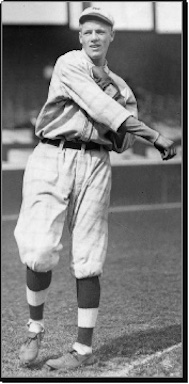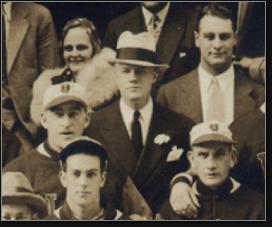
Sport: Baseball
Born: December 25, 1895
Died: July 25, 1970
Towns: Sayreville & Highlands
Herbert Harrison Hunter was born December 25, 1895 in Boston and grew up in Sayreville, NJ. The actual date is a contrivance, as the hospital housing his birth record burned down. He was one of eight children born to Robert and Fannie Hunter, who later moved the family to the Jersey Shore town of Highlands. Herb was a standout outfielder and first baseman in Sayreville and later for the Atlantic Highlands High School team. He had a smooth, natural swing but also tended to be both impulsive and absent-minded. In the summers, he played semipro ball for teams in Red Bank and Long Branch. At 17, he played minor-league ball for a team in New Hampshire and the following year, 1914, he played for another semipro club, the Brockton Shoemakers, in Massachusetts.
Pro ball was not Herb’s long-term goal. He had his sights set on a military career. In 1914, he enrolled at the Linsley Military Institute in West Virginia, hoping to go to West Point. During his year at Linsley, Herb batted .572 for the baseball team, drawing the interest of several big-league clubs. He signed a contract with the New York Giants but missed the 1915 season due to various injuries. The following spring, he made the big club and hit his first (and only) major-league homer against the Pirates.
Herb played in 21 games for New York in 1916 before being packaged with Larry Doyle—the previous season’s NL batting champ—in a trade for third baseman Heinie Zimmerman of the Cubs. Early in 1917, the Cubs sold Herb to Vernon of the Pacific Coast League. Vernon in turn sold him to the San Francisco Seals, where he spent the better part of three seasons. In 1920, he played briefly for the Boston Red Sox and, in 1921, saw limited action for the St. Louis Cardinals. Herb’s final pro season came in 1922, when he played for the Arkansas Travelers with future Hall of Famer Travis Jackson, then an 18-year-old shortstop.
During Herb’s years in San Francisco, he became friendly with several visiting Japanese baseball players. In 1920, he was a member of an American team that toured Japan.
Following the 1921 season, Herb was invited to coach at Waseda University and Keio University, and impressed the players with his knowledge and friendly demeanor. He was presented with ceremonial swords by the students at each school. Several players on the 1920 tour were disrespectful to the Japanese players and had left their hosts with a less than positive impression. So when talk of bringing another team of Americans to Japan in 1922, Herb was asked to pick the players and make the arrangements.
Although Herb’s 1922 tour was not the first of Japan, it was the first to bring big-name players across the Pacific. On the team were future Hall of Famers George Kelly, Bob Meusel, Waite Hoyt and Herb Pennock, as well as Irish Meusel, Joe Bush, Luke Sewell, and Bibb Falk. After several games in Japan, the tour continued to Seoul and Beijing. Herb injured his arm during a game in Korea, ending his career as a player.
Herb moved back to Highlands and stayed in baseball as a manger and promoter. He took some of the money he’d earned and purchased a coal delivery company in Atlantic Highlands, and piloted the town team. In 1926 and again in 1927, a team of Japanese students visited Herb and played the Atlantic Highlands club during a tour of the U.S. Herb also got his big-name baseball friends to play postseason exhibition games in Atlantic Highlands, often as a first stop on cross-country barnstorming tours. Even the Babe showed up for these contests.
Herb tried to make at least one visit a year to Japan in the 1920s, during which he did a little coaching and laid the groundwork for a future All-Star tour.
That tour took place following the 1931 season. Herb partnered with sportswriter Fred Lieb in putting together a club that included some of the great names in baseball: Lou Gehrig, Lefty Grove, Frankie Frisch, Al Simmons, Rabbit Maranville, Mickey Cochrane, and 1929 NL batting champ Lefty O’Doul. Lieb’s involvement apparently came at the insistence of baseball commissioner Kenesaw Mountain Landis. Herb had been arrested in connection with a jewelry theft, and even though the charges were eventually dropped, Judge Landis wanted a second set of eyes and ears on the tour. Even so, Herb was hailed as America’s “baseball ambassador” in news reports.
The tour was a great financial success—although it almost never happened. Less than a month before the players and their wives boarded the Tatsuta Maru for their trip across the pacific, the Japanese invaded Manchuria. Some were saying America and Japan might soon be at war.
The ocean voyage did nothing to lessen tensions. The ballplayers annoyed the Japanese crew with sophomoric pranks and practical jokes. Maranville drew a smiley face on the bald head of a Japanese Admiral while he snoozed in a deckchair.
Once in Japan, the players clowned and showboated to amuse the crowds, not understanding that Japanese fans considered this insulting to their players. They also engaged in some good-natured bench jockeying, which also came as a shock to the congenitally polite Japanese.

A couple of little-known facts from the tour involved Gehrig (upper right). He broke two fingers during one of the contests and had to take a seat on the bench—this in the middle of his legendary 2,130-game consecutive games streak in the majors. Also, Gehrig was one of several players pictured on a set of cards made by Yuasa & Co. Only a handful survive and many collectors of Gehrig cards consider this to be their Holy Grail.
The 1931 tour begat a 1934 excursion, which included Babe Ruth. This was the tour now famous for Moe Berg’s “tourist” films, which were said to have been used in World War II aerial bombing raids. Herb, he was not part of the 1934 group; Lefty O’Doul had been asked to oversee it, and Herb was left out in the cold.
Undaunted, Herb continued to travel to Japan and serve as an unofficial sports liaison until 1940. For a time after that, he distributed baseball bat-shaped mechanical pencils, which were extremely popular advertising premium items for ballplayers working off-season jobs. And Herb continued to be involved in domestic baseball, working as a minor-league umpire and becoming part-owner of a team in Louisiana.
Herb moved to Florida in his later years and managed a hotel. He passed away at the age of 74 in Orlando.